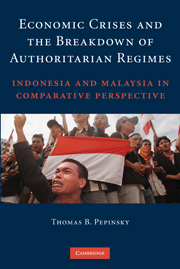Crossref Citations
This Book has been
cited by the following publications. This list is generated based on data provided by Crossref.
Pepinsky, Thomas B.
Geddes, Barbara
McCargo, Duncan
Robison, Richard
Kuhonta, Erik Martinez
Slater, Dan
and
Vu, Tuong
2010.
Discussion of Erik Martinez Kuhonta, Dan Slater, and Tuong Vu'sSoutheast Asia in Political Science: Theory, Region, and Qualitative Analysis.
Journal of East Asian Studies,
Vol. 10,
Issue. 2,
p.
171.
Boix, Carles
and
Svolik, Milan
2011.
The Foundations of Limited Authoritarian Government: Institutions and Power-Sharing in Dictatorships.
SSRN Electronic Journal,
Wallace, Jeremy
2011.
Urban Concentration, Redistribution, and Authoritarian Resilience.
SSRN Electronic Journal,
Weeks, Jessica L.
2011.
Strongmen and Straw Men: Authoritarian Regimes and the Initiation of International Conflict.
SSRN Electronic Journal,
van Donge, Jan Kees
2012.
Governance and access to finance for development: an explanation of divergent development trajectories in Kenya and Malaysia.
Commonwealth & Comparative Politics,
Vol. 50,
Issue. 1,
p.
53.
PEPINSKY, THOMAS B.
2012.
Do Currency Crises Cause Capital Account Liberalization?1.
International Studies Quarterly,
Vol. 56,
Issue. 3,
p.
544.
Bauer, Molly E.
Cruz, Cesi
and
Graham, Benjamin A. T.
2012.
Democracies only: When do IMF agreements serve as a seal of approval?.
The Review of International Organizations,
Vol. 7,
Issue. 1,
p.
33.
Steinberg, David A.
and
Shih, Victor C.
2012.
Interest Group Influence in Authoritarian States.
Comparative Political Studies,
Vol. 45,
Issue. 11,
p.
1405.
Přibáň, Jiří
2012.
Varieties of Transition from Authoritarianism to Democracy.
Annual Review of Law and Social Science,
Vol. 8,
Issue. 1,
p.
105.
WEEKS, JESSICA L.
2012.
Strongmen and Straw Men: Authoritarian Regimes and the Initiation of International Conflict.
American Political Science Review,
Vol. 106,
Issue. 2,
p.
326.
Wallace, Jeremy
2013.
Cities, Redistribution, and Authoritarian Regime Survival.
The Journal of Politics,
Vol. 75,
Issue. 3,
p.
632.
Tanneberg, Dag
Stefes, Christoph
and
Merkel, Wolfgang
2013.
Hard times and regime failure: autocratic responses to economic downturns.
Contemporary Politics,
Vol. 19,
Issue. 1,
p.
115.
Dimitrov, Martin K.
2013.
Why Communism Did Not Collapse.
p.
3.
Pepinsky, Thomas B.
2013.
The domestic politics of financial internationalization in the developing world.
Review of International Political Economy,
Vol. 20,
Issue. 4,
p.
848.
KARCHER, SEBASTIAN
and
Steinberg, David A.
2013.
Assessing the Causes of Capital Account Liberalization: How Measurement Matters1.
International Studies Quarterly,
Vol. 57,
Issue. 1,
p.
128.
Rock, Michael T.
2013.
East Asia's Democratic Developmental States and Economic Growth.
Journal of East Asian Studies,
Vol. 13,
Issue. 1,
p.
1.
Boix, Carles
and
Svolik, Milan W.
2013.
The Foundations of Limited Authoritarian Government: Institutions, Commitment, and Power-Sharing in Dictatorships.
The Journal of Politics,
Vol. 75,
Issue. 2,
p.
300.
Jensen, Nathan M.
Malesky, Edmund
and
Weymouth, Stephen
2014.
Unbundling the Relationship between Authoritarian Legislatures and Political Risk.
British Journal of Political Science,
Vol. 44,
Issue. 3,
p.
655.
Pepinsky, Thomas B.
2014.
Constitutional Change and Democracy in Indonesia.Party Politics in Southeast Asia: Clientelism and Electoral Competition in Indonesia, Thailand and the Philippines.
Bulletin of Indonesian Economic Studies,
Vol. 50,
Issue. 1,
p.
135.
Pepinsky, Thomas
2014.
The Institutional Turn in Comparative Authoritarianism.
British Journal of Political Science,
Vol. 44,
Issue. 3,
p.
631.



